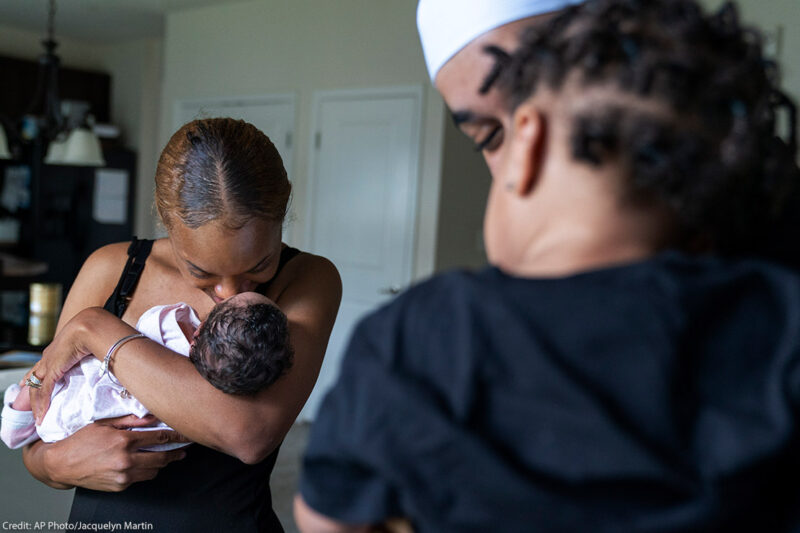Baby Bonds: A Path Toward Prosperity for Future Generations


Being born into poverty often determines what the rest of your life looks like — not just for you, but for your kids and the generations that follow. Babies born into poverty face limited opportunities and begin their adult lives at a significant disadvantage. This persistent disparity is a major obstacle to achieving systemic equality.

Systemic Equality: Equal Access, Better Futures
When we have full and equal access to education, jobs, housing, voting rights, and more, better futures are possible.
Source: American Civil Liberties Union
Wealth inequality in the United States has reached alarming levels, particularly when viewed This wealth gap isn’t just about money; it’s about historical and systemic injustices like redlining and discriminatory policies that have plagued marginalized communities for far too long. Currently, the net worth of a white family is than that of a Black family. Everyone should have access to meaningful economic opportunities and get the chance to build their financial futures, not just the few who have access to wealth. To confront this pressing issue, we need proactive strategies.
Enter “baby bonds” — a simple yet profound idea, primarily originated and championed by economist Dr. Darrick Hamilton. Imagine every child in America receiving a government-funded savings account at birth, managed by federal, state, or local governments until adulthood. These accounts are designed to provide children with the economic resources needed to begin building long-term economic security and generational wealth — and a pathway out of poverty for millions of babies every year.
The way it works is simple: Babies are automatically enrolled at birth and receive a seed deposit that is income-dependent, meaning that lower-income families receive larger deposits, embodying a targeted, universal policy aimed at reducing wealth inequality. Federal and/or state treasuries would invest and administer the funds, which would grow over time until recipients choose to access them when they become adults. At that point, they can use these funds to pay for higher education, homeownership, or entrepreneurship — three of the most proven ways to build wealth in the U.S.
The impact of baby bonds can be transformative. Baby bonds can break the cycle of poverty and make prosperity achievable for the next generation. If administered nationally, baby bonds could . By providing targeted support to lower-income communities, primarily Black and Latine, baby bonds seek to rectify some of the systemic injustices and disadvantages they disproportionately face.
Baby bonds can break the cycle of poverty and make prosperity achievable for the next generation.
The gap between rich and poor continues to widen in the U.S. — and it should be treated as a national emergency. Congress needs to strongly consider creating a national baby bonds program, such as that proposed in the American Opportunity Accounts Act as introduced by Sen. Cory Booker and Rep. Ayanna Pressley. Under the bill, every child born in the U.S. would be provided with a government-funded savings account with seeded and annual deposits based on income. At birth, each child would receive $1,000 with an annual supplement of up to $2,000, with children from the lowest-income households receiving the maximum amount. If the AOAA had been , Black children today would have a median account balance of $27,500, Hispanic children would have $19,800, and white children would have $7,100.
States have already stepped up to the plate. Connecticut led the way and became the first to , providing eligible babies with $3,200 in investment accounts. Washington, D.C. initiated a similar program, with potential funds growing to $25,000 by age 18. In 2022 California followed, offering up to who have lost a parent to COVID-19 or are in long-term foster care.
And the momentum is growing stronger. This year, have considered or proposed baby bond legislation, including New Jersey, Iowa, Wisconsin, Washington, Nevada, Louisiana, Maryland, and Massachusetts. While eligibility would be universal under the AOAA, only babies born under Medicaid are typically eligible under state legislation, underscoring the need for a national program.
As baby bonds catch fire across the country, it’s clear this idea is resonating with Americans of all backgrounds. A recent national YouGov poll commissioned by the ACLU revealed broad support for establishing baby bond programs. Contrary to assumptions that support might be limited to high-cost living areas, the poll results indicate that people from diverse living environments are in favor of baby bonds. Across racial lines, there is also overwhelming support. Specifically, 73 percent of Black voters, 64 percent of Latine voters, 54 percent of white voters, and 60 percent of AMEMSA and Indigenous voters expressed their endorsement of baby bonds.
This widespread support highlights the policy’s potential to bridge racial disparities and garner support from a diverse range of communities. The most notable finding is that support also spans across the political spectrum. A majority of Democrats, Independents, and Republicans are all in favor of the baby bonds policy. This bipartisan support is particularly noteworthy, given that economic investments of this nature often face partisan opposition.
The ACLU stands firmly in support of baby bonds, recognizing their potential to reshape the landscape of racial and economic justice. It’s time to take a bold step toward a more equitable future, where every child has a chance to thrive, regardless of their family’s economic circumstances — at both the state and federal levels.

